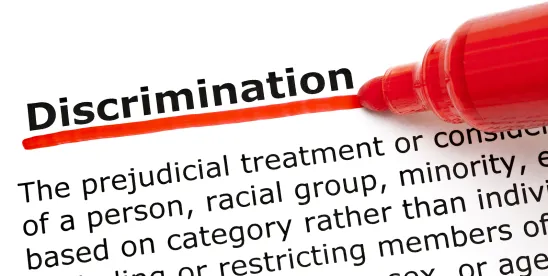On July 31, 2025, the U.S. Department of Justice (DOJ) issued guidance to all federal agencies concerning the prohibition of discrimination based on protected characteristics—such as race, sex, religion, or national origin—in all federally funded programs and activities (the “Guidance”). The Guidance addresses a growing trend of entities adopting Diversity, Equity, and Inclusion (DEI) initiatives that the DOJ currently views as potentially running afoul of federal anti-discrimination statutes. Notably, the DOJ emphasized that DEI programs may expose recipients of federal funds to significant legal liability, including termination of federal funding, False Claims Act (FCA) exposure, as well as civil rights enforcement actions and foreshadowed enhanced enforcement.
The Guidance signals the DOJ’s most recent enforcement posture. It asserts that programs or practices that provide benefits, impose obligations, or make decisions based on protected characteristics—whether explicitly or through proxies such as “cultural competence,” “lived experience,” or geographic targeting—are presumptively unlawful unless they meet strict judicial scrutiny. The Guidance also warns that organizations may be liable for discriminatory practices conducted by contractors or grantees funded by federal dollars.
The DOJ is particularly concerned with race-based scholarships and internships, DEI-focused hiring and contracting preferences, race- or sex-segregated facilities and training programs, and policies that create hostile environments through stereotyping or compelled ideological conformity. Further, the Guidance affirms protections for individuals who object to or refuse participation in such programs, cautioning recipients against retaliatory conduct.
To mitigate enforcement risk, the Guidance outlines “best practices” for ensuring compliance with civil rights laws. These include adopting neutral selection criteria tied to objective qualifications, eliminating quotas and demographic-based benchmarks, avoiding proxy-based eligibility requirements, reviewing third-party partners for compliance, and instituting anti-retaliation safeguards. The DOJ encourages recipients—including educational institutions, government agencies, nonprofits, and private employers—to conduct comprehensive reviews of all DEI-related policies, programs, and training materials and align them with applicable federal civil rights laws such as Title VI, Title VII, and Title IX.
In light of this Guidance, and the shift in federal policy away from DEI programs, organizations receiving federal funding might consider taking steps to evaluate their DEI efforts in anticipation of increased scrutiny. Among other measures, recipients of federal funding may wish to consider the following actions as part of their evaluation:
- Audit DEI programs and materials to identify any policies, eligibility criteria, or training that directly or indirectly consider protected characteristics;
- Eliminate identity-based quotas or targets in hiring, contracting, admissions, and programming;
- Avoid use of what the government now believes are proxies designed to influence demographic outcomes (e.g., requiring diversity statements that indirectly prioritize race or sex);
- Ensure universal access to programming and resources, avoiding segregation or identity-based exclusion;
- Vet third-party partners and include nondiscrimination clauses in all contracts, subgrants, and memoranda of understanding;
- Implement anti-retaliation safeguards and create safe, accessible channels for internal reporting of concerns;
- Train leadership and HR teams to understand compliance with anti-discrimination laws, such as Title VI, Title VII, and Title IX; and
- Document legitimate selection criteria and ensure they are tied to objective, job-related or program-related qualifications.
While the Guidance does not change existing law, it reflects DOJ’s intent to more aggressively enforce anti-discrimination laws in ways that may fundamentally reshape how institutions design and implement inclusion-related programs. These steps are essential to limit exposure to funding loss and FCA-based liability.




 />i
/>i

